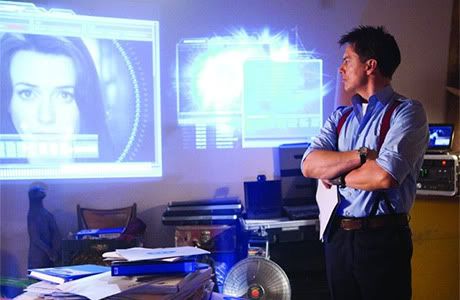Torchwood: Miracle Day - The Middle Men
Thursday, 18 August 2011 - Written by

Torchwood: Miracle Day - The Middle Men
Written by John Shiban
Directed by Guy Ferland
Broadcast on Starz - August 12 2011
BBC Worldwide Productions
From the beginning of this episode addressing the state of suicide, to the ending with a non-apologetic government, ‘The Middle Men’ hit home with its excellent social commentary. This episode finally focused on the Torchwood team and didn’t deviate to include the other subplots. I especially enjoyed the break from Danes and Jilly. The show is much more enjoyable when the team is focused on something together, even when it’s not on a single mission. And though it was frustrating to still have very little of the ongoing plot revealed, except that PhiCorp is in the dark about the Miracle, the overflow camps became public and out of Torchwood’s hands, thus finishing one part of the plot.
Through Maloney we saw a bad person do bad things. His decisions, to incinerate Vera, to slowly stab Rex in the heart, to kill whoever was in his way to protect himself, were above and beyond a person reacting to fear or just following orders. He created suffering in the overflow camp, and rather than face the consequences, he murdered and tortured. He didn’t regret the murder, he was simply afraid of being caught. On the flip-side we have the doctor Gwen confronted. She was a good person doing bad things. Afraid of the changing world, she didn’t know how to keep her profession afloat in the impossible situations of the Miracle. She did not send people to the ovens for any personal reasons, but was doing what she was told and hoping that the leaders she trusted were choosing the right thing. Gwen confronted her on this form of evil, the banality of a good person just following orders, and though distressed, the doctor stuck to her defenses, refusing to blame herself.
And yet these evils were countered with two good people. First, the janitor that helped Gwen escape with her father. At first she was presented as a suspicious figure, eyeing Gwen warily. But instead she was a kind person, recognizing that Gwen was in a desperate situation. This janitor couldn’t fight the system, but she could perform one good deed and help where she could. This good is shown again in Ralph, a soldier, someone broken down and trained into following orders. He did follow orders, going along with Vera’s murder because he didn’t act in time to save her, terrified of being caught as an accomplice. He agonized over what to do, and let Maloney take the lead. But after thinking about what happened, he realized he was doing the wrong thing and had to take personal accountability for his action. As he said when he shot Maloney, saving Esther - “This has got to stop.”
Jack’s search for answers continued this commentary. He found no man behind the curtain, but instead discovered a convoluted and sprawling system, completely masking accountability. There was no one to blame, just a chain of people who did their job without any context. Though someone is pulling the strings, they’ve hidden themselves in the actions of the whole world, an invisible puppet master.
I’d still like to see the answers to the plot come out faster, and I’m looking forward to seeing the team working together in person, rather than in goal. But this was an excellent episode in both its delivery and characters. (I’m still annoyed that Jack is only presented as gay, though. Where’s the omnisexual 51st guy we all know and love?) But the depth of thought in determining the world’s response to the Miracle, now creating a modern-day Holocaust along with all the moral implications that follow, continues to be outstanding. I can’t wait for the next episode, one that unmercifully pulls Gwen between Jack and her family.







